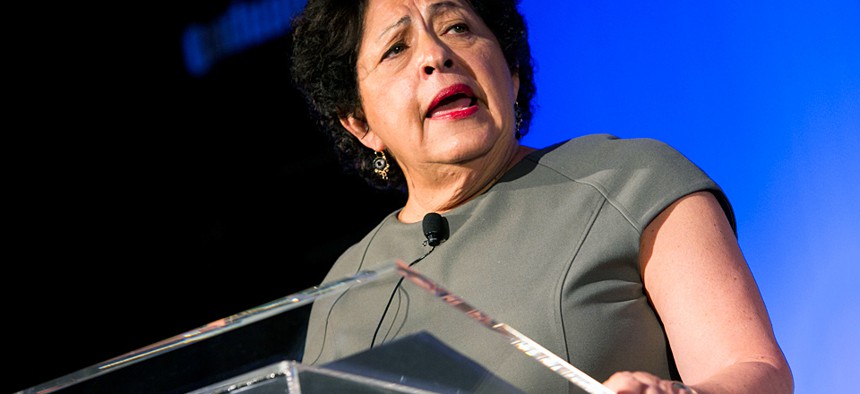
Office of Personnel Management Director Katherine Archuleta told the panel that federal workforce pay changes need to take a comprehensive, rather than piecemeal, form. Kristoffer Tripplaar
Almost Everyone Agrees It’s Time to Overhaul the Federal Pay System
But the path forward remains unclear.
From Democrats to Republicans and administration officials to independent auditors, everyone seems to agree the current General Schedule pay system is extremely outdated and an overhaul of federal employees’ compensation is in order.
While admitting there is a problem is always the first step, actually solving it remains as elusive as ever.
Such was made clear at a congressional hearing Tuesday, where lawmakers and stakeholders came together to say the 65-year-old system -- which covers 80 percent of white-collar civilians -- is broken. Its 15 levels are arbitrary, its inability to reward top performers while punishing poor ones is archaic, and its lack of flexibility to recruit and retain specialized talent is disadvantageous, panelists and witnesses agreed.
“No private company could survive if its personnel system were run this way,” said Rep. Blake Farenthold, chairman of the House Oversight and Government Reform subcommittee with jurisdiction over the federal workforce.
Office of Personnel Management Director Katherine Archuleta told the panel that federal workforce pay changes need to take a comprehensive, rather than piecemeal, form.
“We recognize the system established 65 years ago does need reform,” Archuleta said. She noted President Obama has called for a “commission on federal public service reform,” made up of lawmakers and key stakeholders, to develop recommendations to modernize the federal personnel system.
Several lawmakers and witnesses spoke of the need to increase the use of pay-for-performance at federal agencies. Farenthold said the GS system gives employees raises “based primarily on the passage of time,” while a Government Accountability Office official said the GS scale is too rigid.
Patricia Niehaus, national president of the Federal Managers Association, said the government should do away with the “one size fits all” approach of the GS system.
“The highest performing employees should be rewarded more than poor performers,” Niehaus said. She added that a dedicated worker and a “person who does not go the extra mile, they get the same paycheck.”
Not everyone was on board with pay-for-performance as a solution, however. Rep. Stephen Lynch, D-Mass., the subcommittee’s ranking member, acknowledged federal pay required “more flexibility and accountability,” but questioned the wisdom of widening internal pay inequity. J. David Cox, president of the American Federation of Government Employees, also expressed reluctance to adopt a more subjective pay scale, saying he could not identify a single successful example of pay-for-performance in government.
Lynch conceded any major reforms will likely be hard to come by.
“Government is by its nature very conservative,” Lynch said. “We don’t change much. We got rid of the powdered wigs. That’s about it.”
His concerns are well founded. In his second term, President George W. Bush tried to move all of government to pay-for-performance -- as he had successfully done for the Senior Executive Service -- but the push ultimately fizzled. Archuleta’s predecessor, the current Ambassador to Australia John Berry, revived the effort with Obama’s backing in 2009. Berry’s efforts were similarly stonewalled.
Robert Goldenkoff, GAO’s director for strategic issues, identified several areas Uncle Sam’s personnel system must improve. The difference between a GS-12 accountant and a GS-13 accountant, for example, is difficult to define, which in turn has lessened the transparency in the system. Adding to the problem, Goldenkoff said, is OPM neglecting its statutorily required reviews of agencies’ job classifications since the 1980s. GAO has found the federal workforce in recent years has become more highly educated than the American workforce as a whole, a demographic factor for which the GS pay scale does not account.
Goldenkoff said performance management should be reformed, and said managers need to “step up” in holding poor performers accountable. He pointed to the Goals-Engagement-Accountability-Results, or GEAR, system piloted by the Energy, Homeland Security, Housing and Urban Development and Veterans Affairs departments, as well as OPM, as a framework that should be more widely implemented across government.







